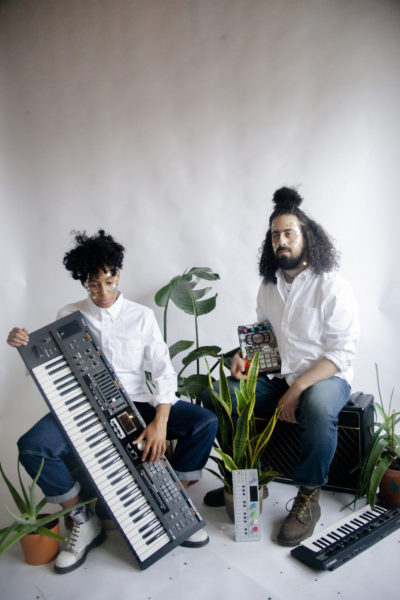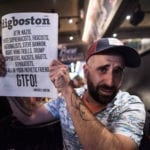
“The foundation of our work is that we’re making music to heal and to give something to our community that allows them to use that music to heal as well.”
FlowerThief, half of Optic Bloom and one of the most gifted vocalists to serenade the Boston music scene in ages, explains why the duo pushed back their latest release, Space Garden, three times. They were first going to drop it last October, but held off for various personal reasons. Then they planned for March, which didn’t work due to obvious setbacks, only to finally settle on June 12, the anniversary of the Pulse nightclub tragedy in Orlando. Still, more time was needed. The album is an “ode to survival,” and both FlowerThief (Wren) and beatmaker Dephrase (Dan) wanted to be in the right headspace before sharing their work. Ultimately, they settled on last weekend to blast off.
“We’re always prioritizing where we are emotionally and spiritually, and if we’re in a place where we can manage the workload of producing and releasing an album, from all of the requests that come in to the admin work that needs to be done,” FlowerThief adds. “We both have full-time jobs. We have to be present when we put something out so there can be dialogue and so we can respond. We don’t want to just throw it out and then be spiritually and emotionally vacant.”
I was lucky enough to catch FlowerThief and Dephrase together on Zoom right before their first live rehearsal in months.
“We’ve stayed in touch and kept a spiritual connection, which has always been the foundation of our music,” Dephrase says. “We’ve definitely been sharing ideas and pacing the way for the next chapter.”
As for the inability to play for fans at venues and tour at this juncture, FlowerThief sees silver linings and serious lessons: “As someone who gets really anxious at shows, the way I’m set up, I just shut down, so I have an excitement over being able to livestream and not be in a space where people are going to be coming up to us before and after. I hope that we hold on to some of what we have learned in this moment. People are at home right now because of COVID, but there were people who were homebound anyway, who were homebound before this, and who are going to be homebound after this.”
The stage has always made the singer anxious, especially around the genesis of Optic Bloom several years ago. One experience, before the pair’s first-ever gig, a set at Thunder Road in Somerville, led to the standout minute-long Space Garden track “Other Girl.”
“When we first started working together, I was in a place where I was questioning my gender identity and trying to figure out what the hell is going on.”
FlowerThief explains that Dan has a tradition of writing an original song before every gig. “It was our first performance, and I was trying to figure out what I was going to do. I was going to perform at a show, and everyone would read me as a woman. At that time my hair was very long, and I hadn’t started physically transitioning or anything like that yet, it was just an internal experience of like, Something is off for me. When I wrote that song, I didn’t know what was going on, and I didn’t like the way that people were projecting onto me, like, This is a Black, light-skin curly hair, probably sings smooth R&B.”
FlowerThief continues, “There’s a way for people to indulge in the gender binary [regarding producer-singer duos], like, Super-femme singer girl and producer dude-guy.”
“It’s like, Sticks his face in GameBoy all day,” adds Dephrase, poking at the nerdy basement tropes in which fans and reporters often confine clever and inventive beatmakers. Which is the ocean from which Optic Bloom emerges, with vocals that transcend eras and trends floating on sounds that verge on cacophony but are stitched together with care and intention.
“Someone had actually said, when we started working together, that it was good that Dan got a woman, because [Dan] can bring the beats and the content, and she can bring that sex appeal,” FlowerThief recalls. “What the fuck? What is that? Dan was like, Fuck that, I’m wearing a dress.”

Though it’s futile to align Optic Bloom with any trend or label, they have been honored under categories including New Artist of the Year—as noms at last year’s Boston Music Awards—and as curators for the MFA Late Nites series.
“I feel like we can really shine when we’re in a greater art space where it’s more than just the music that people can connect to,” Dephrase says. “That’s kind of always been our foundation. So finding more opportunities like that, whether we can curate an event space, we were headed in that direction and we’ll be looking that way in the future.”
In a way, Optic Bloom’s been stylistically soothsaying since inception. Though Space Garden was recorded over the past two and a half years, thematically and musically, it’s as fit for the current state of affairs as anything written in the recent quarantine.
“I’ve been Black my whole life,” FlowerThief says. “I’ve been queer, I’ve been trans, and so things that I think are meeting the world consciousness right now are things that I’ve been grappling with. Even with COVID, navigating some of my own experiences around chronic illness, mental illness and sickness in my family and all of that, yeah, I feel like this music can be supportive for people in this moment, and I feel grateful that me and Dan were able to work with these raw materials in our lives like, How do we navigate? And now that the volume is turned up for everyone, it does feel good to be able to put something out and say, Yo, this is tested. We’ve been living in this.
“We listen to these songs as a way to survive, and as a way to heal, and we know it works, because we’re still here.”
STREAM: ARTBEAT TAKEOVER @ THE JUNGLE W/ OPTIC BLOOM. THU 7.16. 8PM. MORE INFO AT SOMERVILLEARTSCOUNCIL.ORG.
A Queens, NY native who came to New England in 2004 to earn his MA in journalism at Boston University, Chris Faraone is the editor and co-publisher of DigBoston and a co-founder of the Boston Institute for Nonprofit Journalism. He has published several books including 99 Nights with the 99 Percent, and has written liner notes for hip-hop gods including Cypress Hill, Pete Rock, Nas, and various members of the Wu-Tang Clan.

